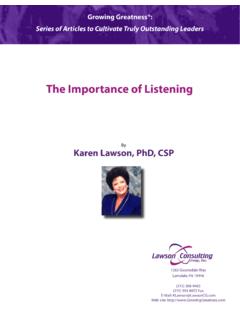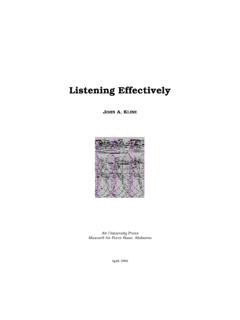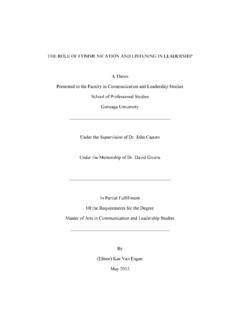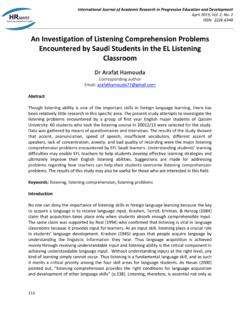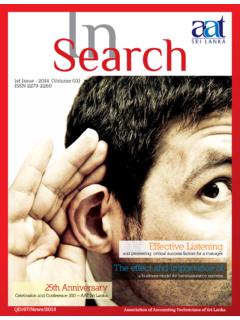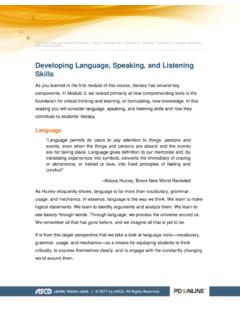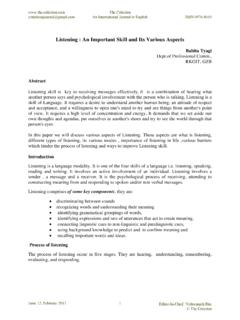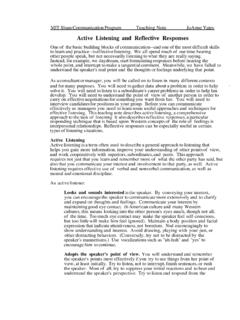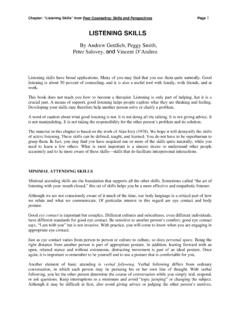Transcription of The Importance of Listening - 2012 Book Archive
1 This is The Importance of Listening , chapter 4 from the bookPublic Speaking: Practice and Ethics( )(v. ).This book is licensed under aCreative Commonsby-nc-sa ( )license. See the license for more details, but that basically means you can share this book as long as youcredit the author (but see below), don't make money from it, and do make it available to everyone else under thesame content was accessible as of December 29, 2012, and it was downloaded then byAndy Schmitz( )in an effort to preserve the availability of this , the author and publisher would be credited here. However, the publisher has asked for the customaryCreative Commons attribution to the original publisher, authors, title, and book URI to be removed.
2 Additionally,per the publisher's request, their name has been removed in some passages. More information is available on thisproject'sattribution page( ).For more information on the source of this book, or why it is available for free, please seethe project's home page( ). You can browse or download additional books ThinkstockChapter 4 The Importance of Listening Are you Listening to me? This question is often askedbecause the speaker thinks the listener is nodding off ordaydreaming. We sometimes think that Listening meanswe only have to sit back, stay barely awake, and let aspeaker s words wash over us. While many Americanslook upon being active as something to admire, toengage in, and to excel at, Listening is often understoodas a passive activity.
3 More recently,O, the OprahMagazinefeatured a cover article with the title, How toTalk So PeopleReallyListen: Four Ways to Make YourselfHeard. This title leads us to expect a list of ways toleave the Listening to others and insist that they do so, but the article contains asurprise ending. The final piece of advice is this: You can t go wrong by showinginterest in what other people say and making them feel important. In other words,the betteryoulisten, the more you ll be listened to. Jarvis, T. (2009, November).How to talk so peoplereallylisten: Four ways to make yourself , the OprahMagazine. Retrieved may have heard the adage, We have two ears but only one mouth an easyway to remember that Listening can be twice as important as talking.
4 As a student,you most likely spend many hours in a classroom doing a large amount of focusedlistening, yet sometimes it is difficult to apply those efforts to communication inother areas of your life. As a result, your Listening skills may not be all they couldbe. In this chapter, we will examine Listening versus hearing, Listening styles, Listening difficulties, Listening stages, and Listening vs. HearingLEARNING the differences between Listening and the benefits of or HearingHearing1is an accidental and automatic brain responseto sound that requires no effort. We are surrounded bysounds most of the time. For example, we areaccustomed to the sounds of airplanes, lawn mowers,furnace blowers, the rattling of pots and pans, and soon.
5 We hear those incidental sounds and, unless we havea reason to do otherwise, we train ourselves to ignorethem. We learn to filter out sounds that mean little tous, just as we choose to hear our ringing cell phones andother sounds that are more important to vs. ListeningListening, on the other hand, is purposeful and focused rather than accidental. As aresult, it requires motivation and , at its best, is active, focused,concentrated attention for the purpose of understanding the meanings accidental and automaticbrain response to , concentratedattention for the purpose ofunderstanding the meaningsexpressed by a 4 The Importance of Listening75by a speaker. We do not always listen at our best, however, and later in this chapterwe will examine some of the reasons why and some strategies for becoming moreactive critical of ListeningListening should not be taken for granted.
6 Before the invention of writing, peopleconveyed virtually all knowledge through some combination of showing and recited tribal histories to attentive audiences. Listeners received religiousteachings enthusiastically. Myths, legends, folktales, and stories for entertainmentsurvived only because audiences were eager to listen. Nowadays, however, you cangain information and entertainment through reading and electronic recordingsrather than through real-time Listening . If you become distracted and let yourattention wander, you can go back and replay a recording. Despite that fact, you canstill gain at least four compelling benefits by becoming more active and competentat real-time Become a Better StudentWhen you focus on the material presented in a classroom, you will be able toidentify not only the words used in a lecture but their emphasis and their morecomplex meanings.
7 You will take better notes, and you will more accuratelyremember the instructor s claims, information, and conclusions. Many times,instructors give verbal cues about what information is important, specificexpectations about assignments, and even what material is likely to be on an exam,so careful Listening can be Become a Better FriendWhen you give your best attention to people expressing thoughts and experiencesthat are important to them, those individuals are likely to see you as someone whocares about their well-being. This fact is especially true when you give yourattention only and refrain from interjecting opinions, judgments, and Will Perceive You as Intelligent and PerceptiveWhen you listen well to others, you reveal yourself as being curious and interestedin people and events.
8 In addition, your ability to understand the meanings of whatyou hear will make you a more knowledgeable and thoughtful 4 The Importance of Listening vs. Hearing76 Good Listening Can Help Your Public SpeakingWhen you listen well to others, you start to pick up more on the stylisticcomponents related to how people form arguments and present information. As aresult, you have the ability to analyze what you think works and doesn t work inothers speeches, which can help you transform your speeches in the process. Forexample, really paying attention to how others cite sources orally during theirspeeches may give you ideas about how to more effectively cite sources in TAKEAWAYS Hearing is the physiological process of attending to sound within one senvironment; Listening , however, is a focused, concentrated approach tounderstanding the message a source is sending.
9 Learning how to be an effective listener has numerous advantages. First,effective Listening can help you become a better student. Second,effective Listening can help you become more effective in yourinterpersonal relationships. Third, effective Listening can lead others toperceive you as more intelligent. Lastly, effective Listening can help youbecome a stronger public a partner, discuss how you find out when you haven t beenlistening carefully. What are some of the consequences of poorlistening?Chapter 4 The Importance of Listening vs. Hearing77 StylesLEARNING the nature of Listening the people Listening the action Listening the content Listening the time Listening Listening were easy, and if all people went about it inthe same way, the task for a public speaker would bemuch easier.
10 Even Aristotle, as long ago as 325 BC,recognized that listeners in his audience were varied inlistening style3. He differentiated them as follows:Rhetoric falls into three divisions, determined by thethree classes of listeners to speeches. For of the threeelements in speech-making speaker, subject, andperson addressed it is the last one, the hearer, thatdetermines the speech s end and object. The hearermust be either a judge, with a decision to make about things past or future, or anobserver. A member of the assembly decides about future events, a juryman aboutpast events: while those who merely decide on the orator s skill (c. 350 BCE).Rhetoric(W. Rhys Roberts, Trans.). Book I, Part 3,para.
